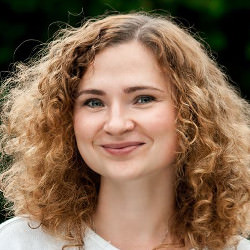 Ekaterina Batueva is an educator and community activist. Originally from Russia, she has gradually become cosmopolitan, with family and friends from all over the world.
Ekaterina Batueva is an educator and community activist. Originally from Russia, she has gradually become cosmopolitan, with family and friends from all over the world.
I have been active in the civil sector since 2009: first through volunteering in local organizations (integration support for migrant and Roma families through education), and then by coordinating and facilitating projects (Youth Included, InBaze, IOM). In addition, since 2010 I have been teaching in the cultural anthropology, regional sociology and regional development PhD program at the University of Economics.
In 2012, my colleagues and I established Youth Included as an open platform for youngsters, a place where one is heard, supported and given feedback, an open space for new ideas and initiatives. In the ensuing years, we have created and implemented international training workshops, visits, conferences, local initiatives and events in collaboration with various stakeholders (cafes, hostels, universities, NGOs).
In collaboration with the great team at Youth Included, I am responsible for strategic planning, creation and development of new initiatives, work with volunteers and educational activities. Moreover, as an educator I try to work on the peaceful co-existence of formal and non-formal education within new initiatives, providing facilitating, training, lecturing and mentoring skills.
More information at: www.youthincluded.com, www.facebook.com/YouthIncluded, www.facebook.com/hfc.community.space
Organization: ‘Youth Included’, Czech Republic
We find Prague 14, with its population of 45,000 people of quite diverse cultural and ethnic backgrounds, a very interesting place to live. There is a high proportion of immigrants (10%) and Roma, who are isolated from the majority population according to local community workers.
Our observation (while networking with existing actors in Prague 14) shows that members of this community are connected to one another by the place in which they live, the schools they go to, and the places in which they meet. However, even being neighbours and living close to one another does not initially create bonds between them. Ethnic and cultural differences, languages, xenophobic stereotypes and prejudices make it difficult for them to connect.
The Prague 14 district city council and local stakeholders (NGOs, schools, civic organizations) are gradually trying to improve living conditions and develop community activities in Prague 14. Nevertheless, there are chasms between the different groups of the local population and they do not come into contact on a regular basis.
Through our community/youth work in Prague 14 we want to raise awareness about the dangers of xenophobia and discrimination, highlight the diversity of the community, show the potential of young people in Prague 14 and verify that, contrary to common belief, an intercultural community can have positive and rewarding impacts for the whole community and area.
We would like to base our work with intercultural youth in Prague 14 on the following principles:
-
We would like to work on issues that youth face in this area gradually and in tandem with youth (peer-to-peer support throughout the project, support of initiatives proposed by youth, development of their skills and competences, monitoring personal stories and sharing positive stories with the rest of the community);
-
We would like to promote activities that are not created for youth, but activities that are created joint (working with young people on development of their ideas over the course of the year with the assistance of volunteers and connecting them to local stakeholders who may have premises and skills to support the initiatives);
-
We would like to work with youth not as a separate entity, but as a part of the intercultural community of Prague 14 (during the project we would like to show that intercultural community is an asset for any community);
-
We would like to promote cooperation and networking among local stakeholders;
-
We would like to promote respect for diversity (cultural, ethnic, religious, gender, sexual).


 Ekaterina Batueva is an educator and community activist. Originally from Russia, she has gradually become cosmopolitan, with family and friends from all over the world.
Ekaterina Batueva is an educator and community activist. Originally from Russia, she has gradually become cosmopolitan, with family and friends from all over the world.